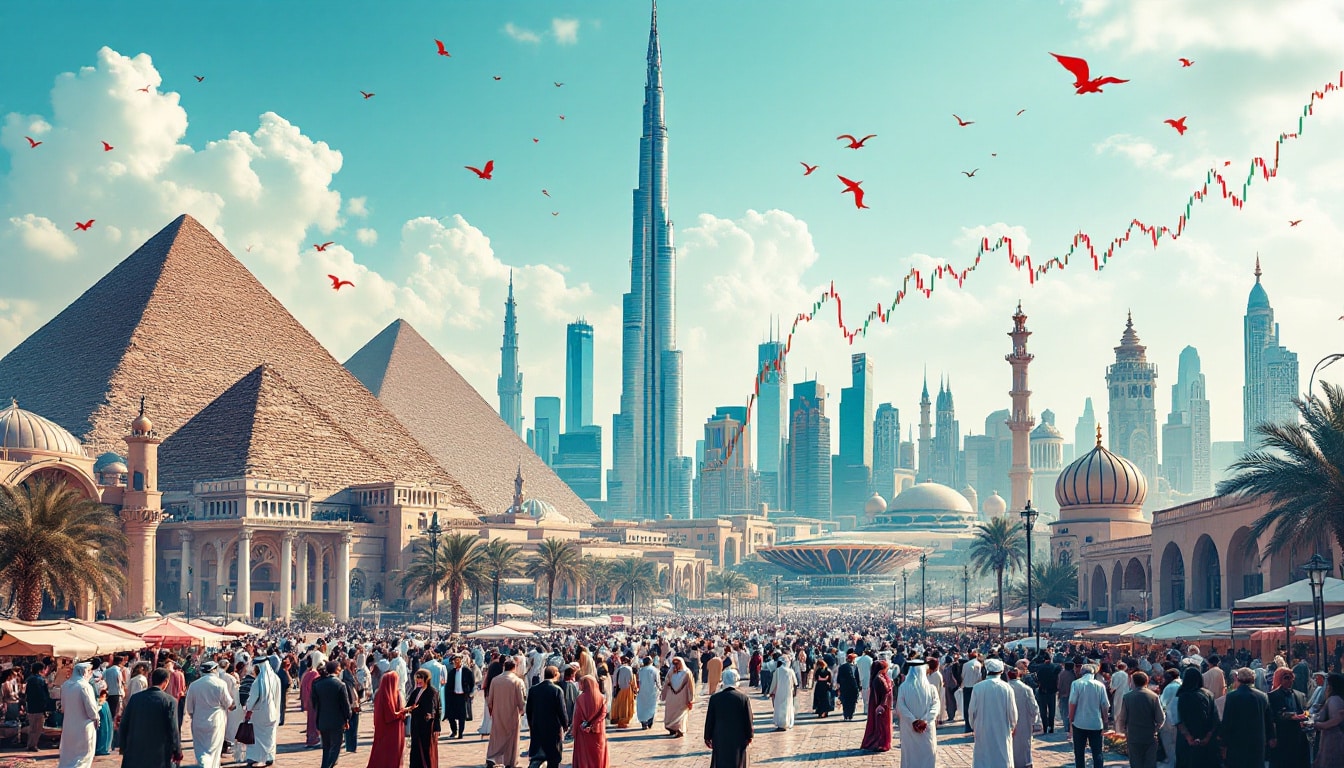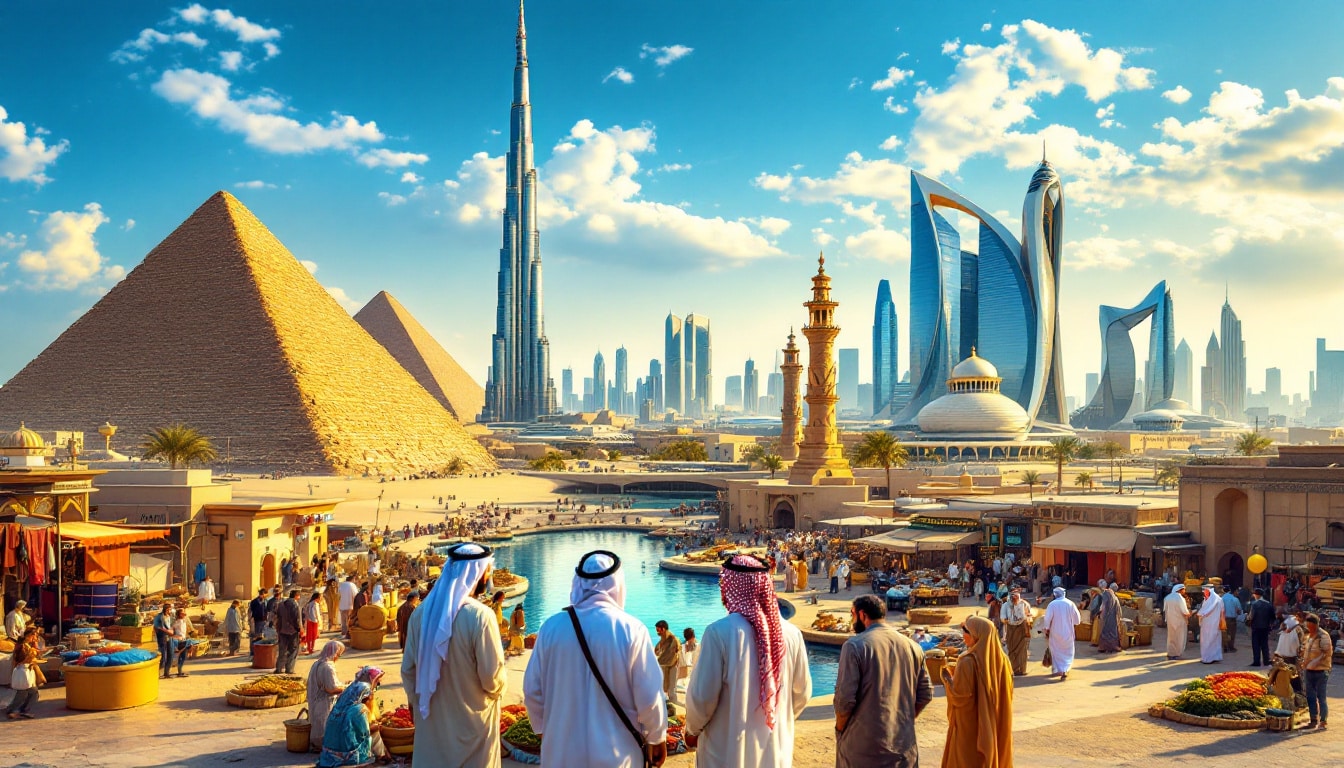Cookies are not just small files on your device.
They are the invisible architects of your online experience.
Every interaction you have helps shape what you see.
Thanks to the use of cookies and data, we are able to provide and maintain our services effectively. This information helps us detect outages and protect our platform against spam, fraud, and abuse. By analyzing public engagement and site statistics, we better understand how our services are used, allowing us to improve their quality. If you choose to “Accept All,” we will also be able to develop new services and measure the effectiveness of advertisements. Furthermore, this allows us to customize content and advertisements according to your preferences. For those who prefer to “Reject All,” certain features will be limited, but your experience will still be tailored to your basic needs. You also have the option to manage your privacy settings at any time to control the use of your data.

The Arab world is a dynamic crossroads where economic, financial, and political issues intersect. Understanding these interactions is essential to grasp regional and global developments. This article explores the main trends and events currently shaping this strategic region.
Table des matières
ToggleWhat are the main economic drivers in the Arab world?
The economy of the Arab world is heavily influenced by its natural resources, particularly oil and gas. However, many countries are seeking to diversify their economies to reduce their dependence on these hydrocarbons. For example, the Vision 2030 initiatives in Saudi Arabia aim to develop non-oil sectors such as tourism, entertainment, and information technology.
Economic growth in the region is also driven by massive investments in infrastructure. Projects like the New Suez Canal in Egypt or the development of smart cities in Dubai reflect this dynamic. These investments not only create jobs but also enhance the attractiveness of Arab countries on the global stage.
Meanwhile, the private sector plays an increasingly crucial role. Reforms aimed at facilitating business creation and attracting foreign investments contribute to energizing the entrepreneurial market. Innovative startups are emerging, particularly in the fields of fintech and health, offering new economic opportunities.
How do financial policies influence regional stability?
The financial policies of Arab countries are decisive in ensuring the economic and social stability of the region. Central banks play a key role in regulating the currency and controlling inflation. For instance, the Central Bank of the United Arab Emirates recently adopted measures to stabilize the dirham against fluctuations in the global market.
Regulation of financial markets is also a major issue. Initiatives aimed at enhancing transparency and corporate governance are being implemented to attract more foreign investors. Arab stock markets, notably those in Dubai and Qatar, are experiencing sustained growth thanks to these reforms, offering attractive investment opportunities.
Furthermore, regional cooperation on financial issues contributes to economic stability. Organizations like the Arab League are working to harmonize economic policies and promote intra-regional trade. This collaboration creates a favorable business environment and strengthens resilience against external shocks.
What are the current political trends in the Arab world?
The political scene in the Arab world is in constant evolution, marked by reforms, geopolitical tensions, and social movements. In several countries, constitutional reforms have been initiated to improve governance and strengthen civil rights. For example, in Tunisia, recent changes aim to consolidate democracy after the Arab Spring revolutions.
Geopolitical tensions, particularly in Yemen, Syria, and the Gulf region, continue to influence political and economic stability. Diplomatic efforts to resolve these conflicts are essential to ensure peace and foster a conducive environment for economic development. Moreover, relations between Arab countries and global powers, such as the United States, China, and the European Union, play a decisive role in regional dynamics.
Social movements, often fueled by economic inequalities and democratic aspirations, also have a significant impact on regional politics. Younger generations, in particular, are demanding greater participation in decision-making processes and a better distribution of resources. This dynamic is pushing governments to adopt more inclusive policies and respond to the needs of their populations.
What economic challenges do Arab countries face today?
Arab countries are facing a series of economic challenges that require adaptive and innovative strategies. One of the main challenges is economic diversification. Excessive reliance on oil exposes Arab economies to fluctuations in hydrocarbon prices. To address this, many countries are investing in diverse sectors such as tourism, information technology, and renewable energy.
Youth represents another major challenge. With a rapidly growing young population, Arab countries need to create enough jobs to avoid high unemployment. Education and vocational training are essential to prepare this population for a constantly evolving labor market. Incubation programs and startup support initiatives are being set up to encourage entrepreneurship and innovation.
Moreover, the management of natural resources and environmental impact are growing concerns. The transition to renewable energies and the implementation of sustainable development policies are becoming essential to ensure environmentally responsible economic growth. Projects like the rise of green technologies in the Gulf region exemplify this commitment.
How is digital finance transforming the Arab economy?
Digital finance is rapidly expanding in the Arab world, profoundly transforming economic and financial structures. Fintech technologies, such as mobile payments, online lending platforms, and cryptocurrencies, facilitate access to financial services, particularly for unbanked populations.
Arab governments are actively encouraging innovation in this sector to stimulate financial inclusion and economic efficiency. Initiatives like fintech free zones in Dubai and Bahrain attract innovative companies from around the world, creating ecosystems conducive to the growth of financial technologies.
The digitization of financial services also contributes to cost reduction and improved transparency. Online transactions and digital banking services offer greater convenience and better management of resources. Additionally, data collected through these platforms allow for more detailed analysis of economic trends and facilitate informed decision-making.
A notable example is the rapid adoption of cryptocurrencies in certain regions of the Arab world. This trend opens new economic perspectives but also raises regulatory and security questions. Financial authorities are working to establish regulatory frameworks to govern the use of crypto-assets and protect consumers.
What is the impact of international relations on the Arab economy?
International relations play a crucial role in the economic development of the Arab world. Partnerships with major economic powers like the United States, China, and the European Union influence investments, trade, and technology transfers. For example, the free trade agreement with China under the Belt and Road Initiative opens up new opportunities for Arab companies in the Asian market.
Regional economic cooperation agreements, such as those within the Gulf Cooperation Council (GCC), strengthen trade links and facilitate the exchange of goods and services. These alliances also allow for resource pooling and the development of large-scale continental projects, such as transportation infrastructure and energy initiatives.
Moreover, economic diplomacy aims to attract foreign direct investments (FDI) by offering tax incentives, favorable regulations, and modern infrastructure. These efforts result in increased FDI, essential for driving growth and creating jobs in the region.
What are the future prospects for the Arab economy?
The future prospects for the economy of the Arab world are promising, despite current challenges. Continuing economic diversification, technological innovation, and structural reforms are key elements that will determine the growth trajectory of the region. Investments in education and skill development will address the needs of a modern and global economy.
Renewable energies also represent an important area for growth. With abundant solar and wind resources, Arab countries can become leaders in green energy production, thereby reducing their carbon footprint and contributing to the fight against climate change.
Furthermore, ongoing digitalization continues to transform traditional sectors. The adoption of technologies like artificial intelligence, blockchain, and the Internet of Things (IoT) opens new perspectives for efficiency and innovation across various fields, from health to agriculture.
Finally, political stability is a determining factor for future economic growth. Governments capable of maintaining peace and promoting inclusive policies will attract more investments and foster an environment conducive to economic growth.
To delve deeper into these subjects and discover the latest trends, check out the following articles:








